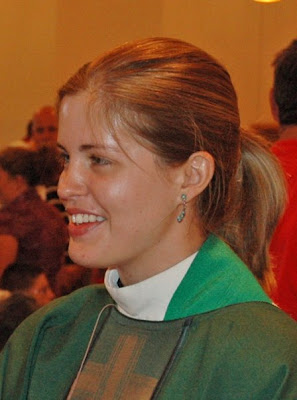At the conclusion of the liturgy every Sunday, I tell the people to go.
Well, actually, I tell them they should come downstairs for coffee, food and fellowship. And then, after that, they should go into the world to love and serve the Lord. I take full advantage of the rubric which says theat the people should be dismissed with "
these or similar words." (By rights, this part of the liturgy ought to be done by a deacon. At the moment, we have no deacon.)
This fits neatly with a recurring theme in my preaching: that the old mission strategy of building a Church and opening the doors may have worked once (though I'm not convinced), but it certainly doesn't work now. The work of the Church is out there in the world.

That was why I was struck by this pictorial essay from the
Chicago Tribune about Episcopal priest Lane Hensley of the Church of the Transfiguration in the Chicago suburb of Palos Park, who went to the local commuter train station and offered the imposition of ashes to any commuters who desired it.
This wasn't the only place this sort of thing happened - it was just the first I read about. Another example was an ecumenical initiative in
St. Louis - though that one apparently involved a more extended mini-liturgy.
There has been a lot of discussion about this
here,
here,
here and in various other places.
Several commentators have a legitimate concern about the propriety of detaching a symbolic thing and ritual act (ashes and the imposition of ashes) from their proper context. What does it mean, to the average person, to have ashes smudged on their foreheads with an admonition to recall that "you are dust, and to dust you shall return?" Does the separation of the symbol and ritual from their proper context impair their meaning and strip them of their significance? And does this feed into the consumer culture - creating, as it were, a liturgical drive-through McSpirituality?
I think that these are very real and very legitimate questions. (After all, if my friends Dan Martins and Elizabeth Kaeton are asking the same tough questions, they must be legitimate questions.)
But I also think they miss a larger reality about our present context.
A generation or two ago, we could safely assume that the majority of those rushing by on the train platform in Chicago were (at least nominally) affiliated with some organized religious body. If they were from a Christian Church with a liturgical tradition that observed Ash Wednesday, we could similarly assume that, if they weren't going to be attending Church that day, the decision was more or less a conscious one - even if it was a default decision.
That was Christendom. Or at least the dying days of Christendom.
This is post-Christendom.
Today, for most of those rushing by, whatever faint religious affiliation remains is a distant memory of an hereditary affiliation. (
I think Grandma was a Lutheran. Or was it Baptist? Maybe Church of England?) If they aren't going to attend an Ash Wednesday service, it's mostly because a) they didn't realize it even
was Ash Wednesday, b) they had no idea what Ash Wednesday was, c) it would never occur to them to attend a Church service on a Sunday, let alone a regular work day.
Yet, if the assorted demographics tell us anything, this same generation is yearning for spiritual meaning. There is a hunger for a community of faith and for a religious sensibility which is neither a bland "be kind to others" nor an angry denunciation of non-conformity.
Yes, it challenges the religious sensibility of those who are already inside the doors. But then, so did Jesus when he healed on the Sabbath.
I'm inclined to think that Fr. Hensley's approach offered too little context. Practically speaking, I suspect the roughly three minute liturgy in St. Louis would be to much context in the context. (And, like several commentators at the various websites, I have some issues regarding the ecclesiastical haberdashery.)
But I like the idea. My quibbles on the execution are minor and easily managed.
To go out into the world and to proclaim to people - in a respectful and inviting way - their need of God, of grace, of repentance. That, it seems to me, is the Gospel in action.
If it awakens only one person, was it not worth it?
(The Diocese of Missouri page has a video that one cannot embed. Go check it out at the bottom of
this page.)
 In the Olympic event that mattered most to Canadians, Canada took home the Gold in men's hockey with a heart-stopping, sudden death overtime win over the United States. Sid the Kid from Cole Harbour, Nova Scotia put the game away 7:40 into a 20 minute overtime period.
In the Olympic event that mattered most to Canadians, Canada took home the Gold in men's hockey with a heart-stopping, sudden death overtime win over the United States. Sid the Kid from Cole Harbour, Nova Scotia put the game away 7:40 into a 20 minute overtime period.



